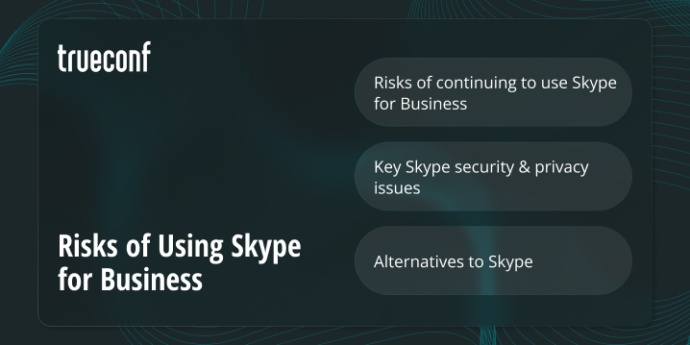Risks of Using Skype for Business in 2026: Security & Modern Alternatives

Skype for Business once played a significant role in enterprise communication, but its relevance has sharply declined following Microsoft’s decision to discontinue support. Continuing to rely on this outdated platform not only limits functionality but also exposes organizations to mounting security, compliance, and productivity risks. As cyber threats grow more sophisticated, businesses must critically assess whether holding onto obsolete systems like Skype for Business is worth the vulnerabilities and operational inefficiencies they create.
Risks of Continuing to Use Skype for Business
Maintaining the use of Skype for Business introduces numerous vulnerabilities that could potentially compromise the overall effectiveness, protection and cooperative capabilities of your business entity. To start with, Microsoft has officially declared the discontinuation of Skype for Business, transferring its attention to Microsoft Teams. This implies that there will be no forthcoming updates, enhancements, security fixes or assistance provided, thus escalating the susceptibility to cyber threats. Subsequently, depending on obsolete technology can restrict the technological incorporation and cooperative functionality found in contemporary communication platforms. For example, Teams provides a more streamlined amalgamation with other Microsoft 365 applications, a feature that Skype for Business does not possess.
Additionally, with the discontinuation of updates, it is likely that the user experience will progressively degrade, possibly resulting in a reduction in productivity. Lastly, the absence of assistance from Microsoft could result in extended periods of downtime and unresolved technical complications.
Key Skype Security & Privacy Issues (As Highlighted by Comparitech)
1. Lack of Default End-to-End Encryption
- Skype does not provide end-to-end encryption (E2EE) by default. To enable it, users must manually initiate a “private conversation” for each chat, and only then are messages, calls, and files encrypted in an E2EE manner.
- This contrasts sharply with apps like Signal, which offer E2EE by default across all communications.
2. Data Collection by Microsoft
- Skype operates under Microsoft’s broader consumer privacy policy, which does not explicitly mention Skype. This lack of specificity makes it difficult to know exactly what user data is collected.
- Potentially collected data includes profile picture, username, password, email, location, birth date, and contact lists. If users make phone calls through Skype, payment information may also be collected.
3. Privacy Exposure: Microsoft Has Access
- Without default E2EE, Microsoft retains the technical capability to access or log Skype communications, raising concerns about user privacy.
- This means that unless users specifically enable private conversations, their chats and calls could be accessible to Microsoft.
Alternatives to Skype
Zoom
Zoom is a fantastic option due to its extensive features and superior video conferencing quality. Google Hangouts, conversely, is an excellent choice for personal interactions or small teams, providing video chats, instant messaging, and VoIP phone calls. It is seamlessly integrated with other Google services, making it extremely convenient for those who use Google.
Microsoft Teams
Microsoft Teams is yet another Skype alternative, particularly for business purposes, since it is designed to facilitate collaboration with file sharing, group discussions, and video conferences. For Apple users, FaceTime is a solid choice, as it provides end-to-end encryption for secure communication.
WhatsApp, a popular messaging application, supports both voice and video calls, and allows users to share files and locations. Businesses can also use WhatsApp Business Web to manage customer conversations more efficiently through their desktop browsers. Viber, another similar platform, also provides instant messaging, voice and video calls.
WebEx
WebEx, a product from Cisco, is a preferred choice amongst businesses as it offers video conferencing, digital meetings, screen sharing, and more. Finally, Slack, although primarily a team messaging application, also supports video calls and boasts a broad range of integrations with other productivity applications.
TrueConf as a Case Example
TrueConf exemplifies a potent embodiment of a cutting-edge corporate solution, delivering superior video meetings and integrated communication services. As a distinct offering, TrueConf has dramatically altered the communication methods of enterprises, introducing a system that accommodates 4K video calls, information exchange, real-time messaging, amongst other features, all consolidated in one location. Its advanced technology is engineered to function flawlessly across any gadget or operating platform, rendering it a versatile tool for businesses of varying scales.

Regarding scalability, TrueConf acts as a tangible illustration. Ranging from small-scale businesses to large corporations, its solutions are crafted to evolve with the enterprise, accommodating a growing quantity of users without sacrificing performance or dependability.
TrueConf also shows a robust dedication to ongoing enhancement. Regular updates are made to their software to incorporate fresh features and guarantee compatibility with the most recent technologies.
How does Skype for Business compare to TrueConf?
|
Feature |
TrueConf |
Skype for Business |
|---|---|---|
|
Deployment type |
On-premises or cloud |
On-premises or cloud |
|
4K (UltraHD) video support |
Yes |
No |
|
Compatibility with SIP/H.323 endpoints |
Yes |
Requires purchasing an external third-party gateway |
|
Dial out and telephony |
Yes |
Available upon purchasing all three levels of CAL licenses |
|
Active Directory Import |
Yes |
Yes |
|
Single network port operation |
Yes |
No |
|
Unlimited video layouts |
Yes |
No |
|
Number of users in a free version |
1,000 users for an unlimited period of time |
New Skype subscriptions are not available. |
Take your team communication to the next level with TrueConf!
A powerful self-hosted video conferencing solution for up to 1,000 users, available on desktop, mobile, and room systems.
Conclusion
The end of Skype for Business marks more than just the retirement of a tool—it represents a shift toward modern, secure, and scalable communication platforms. With no future updates, unresolved vulnerabilities, and diminished performance, the risks of staying with Skype far outweigh its fading benefits. Enterprises that prioritize data protection, regulatory compliance, and seamless collaboration should transition to advanced solutions such as Microsoft Teams, Zoom, WebEx, or TrueConf. By adopting modern platforms, organizations can safeguard sensitive communications, improve productivity, and future-proof their collaboration environment.
About the Author
Olga Afonina is a technology writer and industry expert specializing in video conferencing solutions and collaboration software. At TrueConf, she focuses on exploring the latest trends in collaboration technologies and providing businesses with practical insights into effective workplace communication. Drawing on her background in content development and industry research, Olga writes articles and reviews that help readers better understand the benefits of enterprise-grade communication.



Follow us on social networks